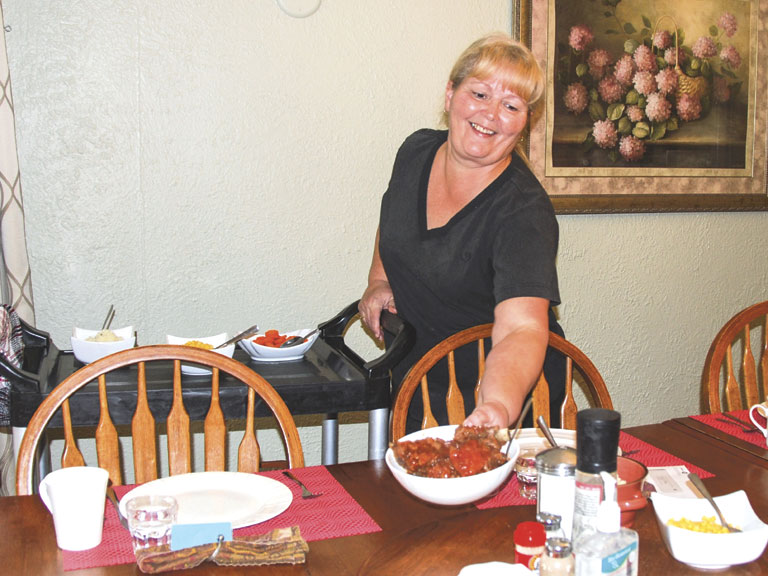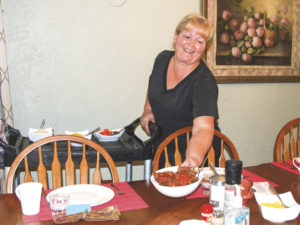County News
Pushed out

Retirement homes being squeezed out by regulations
Ten people live at Publow Retirement Home on King Street in Picton. It is their home. It is close to shops and services downtown and within walking distance to almost anything one might need. It feels like home. Residents gather at lunch time around a large oak table—all its leaves are permanently inserted to give it the length the fill the large dining room with a view of the garden. They chat about the news, brag about their grandchildren and complain about the weather.
There are quiet, comfortable corners to sit and read. There is a larger area to gather and watch television. Each resident room is decorated and equipped to suit its occupant. No two rooms are alike—each as different and unique as the folks who live here. They are mostly women and a few men. Military veteran George Wright lives here. Few have pensions—most get by on their savings and social security.
Their home is under threat. As is every other retirement home in the province. A gathering storm of bureaucracy and regulations is choking small, mostly rural, retirement home operators. Some have already given up—others are on the edge.
“Where will they go?” asks Bernadette Storms of Publow House. She has owned and operated Publow House since 2007. Early next year, she will surrender her retirement home licence—not because she wants to, but because she can no longer afford to manage the regulatory requirements.
“Many of my residents can’t afford to live at the Wellings or the Manor on Loyalist Parkway. It just breaks my heart.”
But Storms says she can’t fight off the tentacles of regulation fast enough.
She and her husband, Steve opened Publow to serve a need in the community, to provide a safe and comfortable home—not an institution. She has little time now to serve her residents— it is consumed by regulation compliance.
“The bureaucracy puts me behind my computer most of the day—rather than here with the residents,” says Storms.
The challenges aren’t exactly new—but the increasing frequency of random inspections, a litany of orders and the sheer cost of staying ahead of the mounting paperwork is forcing her to make a very difficult decision. She expects others will follow.
The trouble started with a tragedy in Quebec.
Just after midnight on January 23, 2014, a fire started in the kitchen of Residence du Havre in L’Isle-Verte, about 230 kilometres east of Quebec City. Thirty-two residents of the retirement home died that night. A coroner’s inquest found a long list of problems, including gaping shortfalls in the town’s firefighting capacity and emergency response. But what stood out in the Coroner’s findings, was that the home wasn’t equipped with a sprinkler system, nor did it have an emergency evacuation plan.
The Retirement Home Regulatory Authority was established by the Ontario government in 2011, as a brand-new bureaucracy created to monitor and regulate the retirement home sector. It charges each home a licensing fee, in return it seeks to govern the workings inside each home for the safety of residents.

Linda Moxam sets out lunch around the communal dining table at Publow House in Picton.
The 2014 tragedy in Quebec invigorated the regulatory authority with a new sense of purpose and determination. That year, the Ontario government announced that retirement homes would be required to install sprinkler systems within five years. Many rural retirement home operators have said this will put them out of business. It has made no impact.
Publow House is on a municipal water system, yet the cost to retrofit this home is untenable. For Carriage House in Cherry Valley, the provincial decree could put it out of business.
Earlier this summer, the province said it was putting up $6.5 million to assist these homes to meet this requirement. Nothing has been offered to Storms in terms of relief or assistance.
But the issue is bigger than just the cost. Publow House is an old Picton home. It would be a massive undertaking to install a fire sprinkler system in this home. It would mean closing the home for weeks and perhaps months—forcing residents to find other accommodations in the interim.
“Where are they supposed to live in the meantime?” asks Bernadette rhetorically.
The Storms can’t continue like this. They have decided to give up their retirement home licence in the new year. They’ve hired a lawyer to advise them through the process. They fear that if they mishandle this transition they could be subject to tough penalties under the Provincial Offences Act.
So in February, Publow House will become a room and board facility only. What this means is that that neither Bernadette nor her care staff will be permitted to administer or monitor medication for the residents. As of February, it will be illegal for them to help residents with their pills. She shakes her head in disbelief because she fears these regulations are making her residents less safe.
“It is heartbreaking,” explains Storms. “Some residents will have to move. But if this doesn’t work we will have to close.”
She says her decision is not due to one single thing, but rather the steady and unrelenting burden of government interference in her business. She says the system benefits large institutions with the staff and resources who can manoeuvre through the regulatory burden. She believes the system is stacked against small, family operations like Publow House.
Mark Jacoby is the manager of communications for the Retirement Home Regulatory Authority. He says his organization’s “paramount concern is to protect the approximately 55,000 senior citizens living in more than 700 licensed retirement homes in Ontario.”
“We conduct regular inspections of all retirement homes,” said Jacoby by email. “When we find homes do not meet minimum standards of care, we may issue orders and work with them to bring them into compliance. When we talk about minimum standards of care, we are talking about things like safe preparation and handling of food; resident safety; ensuring there are plans in place and properly trained staff who can evacuate residents in case of a fire; and ensuring that properly trained people are available to administer medication.”
Yet the burden of these regulations is forcing small rural retirement homes like Publow House to surrender their ability to assist residents with their medication. Bernadette Storms asks how this helps her residents.
Many of the regulations do in fact seem as though they are written for much larger facilities. For instance, Storms is required by the RHRA to have, and maintain a snow removal contract with an external provider, and she must have paperwork to prove it.
“When it snows, I roll over and wake up Steve and he shovels the walks. We don’t have or need a service. It’s just sad.”
Publow House employs five part-time caregivers and two more occasional workers.
“They are trying to make us all institutions,” said Bernadette. “They are herding us all into large, corporate and sterile facilities. Residents are being treated like cattle to be managed. They have no say in any of this. They don’t deserve this.”

This is a sad situation, regulating a private home with residents that choose to live there, what business does the government have to intervene? Are they going to get involved in our private homes? What if we are caring for an elderly person in our home and helping them with their medication, do we now need special training, sprinkler systems in our homes, fall safe programs, licensed kitchens, fire alarm drills, licensed snow removal……. really? This sounds like a way to put people out of business and it looks like a make work project for regulation that give a few more people, government jobs.
The government needs to stay out of these private homes, they get no funding from the government unlike larger places like the Manor and their shiny new addition or the Wellings. The residents that choose to live in a private retirement home do so by choice. They are not forced. They don’t need nursing care, just a place to call home that serves meals, does their housework and laundry. Someone to call if they don’t feel well and check on them if they don’t come for a meal. Something that their family would do for them but can’t anymore. And most important, get them medical care when and if they need it, not provide it. If the residents in private homes need some nursing care, the Access Centre needs to be involved, not the staff. When you step across that line and offer nursing care, you leave the umbrella of retirement home and enter the world of nursing homes. Lets call these other homes what they are. These new government retirement homes are glorified nursing homes, not where I want my Mother to live until she positively has too. I like that she feels that the “staff” at her retirement home is her family when I can’t be there.
Thank you Esther, I just saw your reply. Very well said, and so true!
The provincial government is tone deaf to the realities of rural living vs urban. Rules and regulations suited for large institutions found primary in urban settings are not often realistic in a more rural setting with their smaller populations and in this case more family like senior homes with 15 or less residents. The bureaucrates of this government should work with places like the Publow House to keep seniors in their community rather that “storing” them in large institutions away from family and friends. It would help to preserve rural Ontario and help those of us who live here feel the “government” understands us.
My father resided with Bernadette and Steve at Publow house for 10 months; it was the perfect solution to my problem of not being able to be there every day for him….. they saved my sanity! He needed help to care for himself, needed a little support, and he LOVED being there. Friendly caring people to make sure that he had balanced home cooked meals, lots of friendly people to visit with; every now and again cookies to sneak into his pockets on his way through the kitchen. It was a perfect home for him after my mother passed away. I’m so sorry to hear that the Storms are being pushed out of the retirement home business….they sure run a nice one.
I can’t agree more. We just moved my Mom in law to the Maples from MLP Residence which was very expensive and too institutional. She loves her new “home” and has more personal space. A small familiar very friendly staff and the owners are amazing and attentive to her needs. Herding our aged love ones like cattle is sad. I have worked in long term care and the large residences do try but it is just not possible. The powers that be are writing the same legislations yet these places are apples and oranges. Very sad.
This is such a shame to loose the small homey feel of a retirement atmosphere. As well these people have become a family. Home cooked meals, leisure actities and a sense of belonging. I’m sorry that this has happened and hope that you can continue providing excellent services to our seniors in this home.